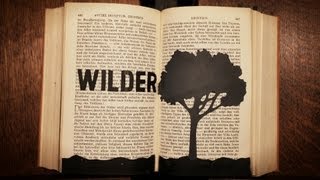(单词翻译:单击)
Mysteries of vernacular: Bewilder, to confuse or puzzle completely.
通用俗语的谜团:Bewilder,是指完全迷惑、困惑。
The root of the word bewilder can be traced back to the Old English word wilde,
“Bewilder”的词根可以追溯到古英语单词“wilde”,
which was used to refer to something that was in a natural state, uncultivated, or undomesticated.
意思是指处于天然状态,未经耕作、未经驯养的东西。
Over time, the word wild was often linked to the Old English word deor.
随着时间的推移,“wild”一词经常与古英语“deor”相联系。
Deor, which was derived from an early Indo-European root that meant breathe,
“Deor”,源自一个意思是“呼吸”的早期印欧语系词根,
was initially used to describe any untamed animal or beast.
其最早是用于描述未经驯服的动物和野兽。
This eventually morphed into the modern word deer, meaning a ruminant of the family Cervidae.
这个词后来变体成了现代单词“deer”,指鹿科动物中的一种反刍动物。

The two Old English words, when mashed together, became wilderness,
这两个古英语单词结合在一起,就是“wilderness”,
meaning a tract of uncultivated land, primarily inhabited by undomesticated beasts.
指一片未经开垦的土地,上面生活着未经驯服的野兽。
From the word wilderness, the word wilder was born.
从“wilderness”这个词里,“wilder”诞生了。
To wilder someone was to lead him astray or lure him into the woods.
“Wilder”某人的意思就是带领他走失,或者是引诱他到树林中。
In the 1600's, the prefix be, meaning thoroughly,
17世纪,前缀“be”,意思是完全的,
was compounded with wilder as a way of tacking on a little extra punch.
跟“wilder”相结合,加重了词的含义。
Someone who was bewildered was thoroughly lost in the wild.
某人如果被“bewildered”,就是完全迷失在也野外里。
From this winding background, bewilder eventually evolved into our current definition, to be completely confused.
经过千绕万绕,“bewilder”终于演化成了我们如今的含义,即使完全迷惑。


